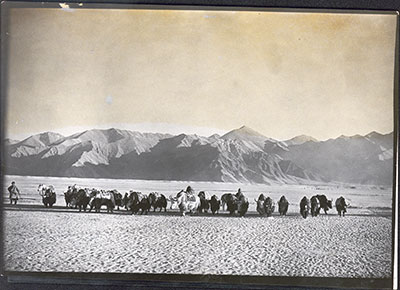
1998.131.217 (Print black & white)


1998.131.217 (Print black & white)

Frederick Spencer Chapman
Frederick Spencer Chapman
January 1937
Lhasa Area >
1998.131.217
119 x 170 mm
Print gelatin silver
Donated 1994
Faith Spencer Chapman
British Diplomatic Mission to Lhasa 1936-37
Frederick Spencer Chapman
9.4
SC.T.2.217
BMR.86.1.22.4
Notes on print/mount - The back of the print is covered with cropping and proof marks. The caption 'Yaks on Sera plain' is give, as is "Lhasa - transferable?". It also states 'Cut as indicated and reproduce facsimile'. There is an instruction to make a significant crop of 9/10" on the right hand side. This would crop the image to the yak on the extreme right and remove the open space on this side of the frame, centring the line of yaks and herders across the print. '28a' has been written in pencil in the top left hand corner on the back of the print. The reference '9-4' has been written on the back of the print in pencil [MS 28/1/2005]
Manual Catalogues - Caption in Chapman's hand-written list of negatives made whilst on the Mission to Lhasa, 1936-7 [See PRM Manuscripts Collection]: 'Yaks coming home in evening across plain: hills behind'; PRM Manuscripts Collection: ‘List of Tibetan Prints and Negatives’ - Book 4: ‘2/3 - Herd of yaks, led by a white one on Lhasa plain’ [MS 13/03/2006]
Other Information - Related Images: Images prefixed with '9' comprise a group of negatives containing images of Trisum sampa, yaks on Sera plain, Sera monastery and Khampa people and all seem to have been taken in January 1937 [MS 13/03/2006]
Other Information - Dates: It is possible that this photograph was taken on January 7th 1937 as Chapman describes in the official Mission Diary for this date how he went out to take photographs of a group of nomads who had recently arrived in Lhasa, commenting on their tendency to place their yak herds out to graze on the Sera plain. He comments in the Diary for : "Although we visited their tents at dawn many of the men had already set off with yak-loads of salt and yak-dung - representing their taxes to be delivered at the Potala. There were still a few yaks and grey and dun-coloured dzos (yaks crossed with cattle) picketed to yak-hair ropes; but most of the herd, numbering several hundred, had already been taken out to find what grazing they could on the sandy barren-looking Sera plain" [MS 17/3/2005]
Other Information - Cultural Background: This is likely to be merchants' caravan because the man on the far left is carrying a long sword, which may have been used to protect the caravan. The pack saddles are made of wood with a woollen blanket underneath. [TS 21/1/2005]
For Citation use:
The Tibet Album.
"Yaks on Sera plain"
05 Dec. 2006. The Pitt Rivers Museum.
<http://tibet.prm.ox.ac.uk/photo_1998.131.217.html>.
For more information about photographic usage or to order prints, please visit the The Pitt Rivers Museum.
© The Pitt Rivers Museum